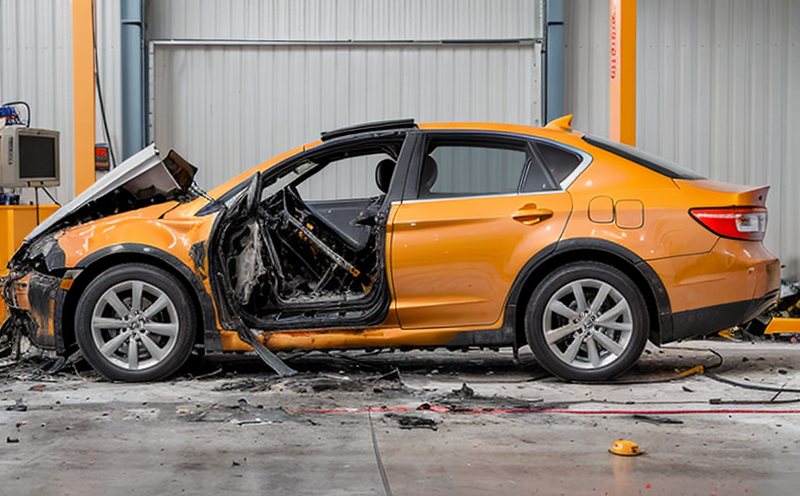JIS C8708 Mechanical Abuse Testing of Automotive Lead-Acid Batteries
The JIS C8708 standard is a crucial guideline in the automotive industry, providing specific protocols for testing the mechanical abuse resistance of automotive lead-acid batteries. This service ensures that manufacturers and suppliers can validate their products' durability under simulated crash conditions, thereby enhancing product reliability and safety.
Automotive lead-acid batteries are critical components in electric vehicles (EVs) and hybrid electric vehicles (HEVs), where the battery's performance during mechanical stress is paramount. JIS C8708 addresses this by defining standardized tests that simulate various abusive conditions, such as drops, compressions, and impacts. These tests help manufacturers ensure that their batteries can withstand real-world scenarios without compromising safety or functionality.
The testing process involves subjecting the battery to a series of mechanical abuses designed to mimic potential accidents or mishandling during vehicle operation. This includes drop tests from various heights, compression tests under specific force loads, and impact tests using different tools and conditions. The primary objective is to evaluate how well the battery withstands these stresses without failing catastrophically.
The acceptance criteria for this testing are stringent, ensuring that only batteries meeting the highest standards pass. Compliance with JIS C8708 not only enhances product safety but also improves market credibility and customer trust. By adhering to this standard, manufacturers can demonstrate their commitment to quality and reliability, which is essential in today's competitive automotive industry.
The testing apparatus used for JIS C8708 includes high-precision drop test machines capable of simulating drops from specified heights onto various surfaces, compression testers that apply controlled force loads, and impact testers designed to replicate real-world collision scenarios. Each piece of equipment is calibrated according to international standards (ISO) to ensure accurate and reproducible results.
Specimen preparation for JIS C8708 testing involves selecting representative samples from the batch being tested. These samples are then prepared in accordance with the standard's requirements, ensuring that they accurately represent the production batch. Proper specimen preparation is critical as it directly impacts the test results and subsequent evaluation of product performance.
Testing protocols outlined in JIS C8708 ensure a comprehensive assessment of the battery's mechanical abuse resistance. The tests are conducted under controlled conditions to simulate real-world scenarios, providing valuable insights into how the batteries behave during abusive events. This information is crucial for continuous improvement and innovation within the automotive industry.
The results from these tests are meticulously recorded and analyzed using advanced data analysis techniques. Reports generated from this process provide detailed insights into the battery's performance under various abusive conditions, highlighting any areas where improvements can be made. These reports serve as valuable tools for quality assurance departments and R&D teams, guiding future product development efforts.
By adhering to JIS C8708 standards, manufacturers not only enhance their products' safety but also contribute positively to overall automotive industry standards. This commitment to quality and reliability is essential in maintaining consumer trust and ensuring a safer driving experience for all users of electric and hybrid vehicles.
- Enhanced Product Reliability: JIS C8708 testing ensures that batteries can withstand real-world mechanical stresses, improving overall product durability.
- Increased Market Credibility: Compliance with this standard enhances the manufacturer's reputation and builds trust among consumers and industry partners.
- Improved Safety: By simulating abusive conditions, JIS C8708 testing helps identify potential weaknesses in battery design, leading to safer products.
In summary, JIS C8708 mechanical abuse testing is a vital service that ensures automotive lead-acid batteries meet the highest standards of safety and reliability. This testing process provides invaluable data for continuous improvement and innovation within the industry, ultimately benefiting both manufacturers and consumers alike.





